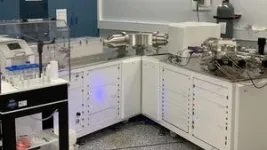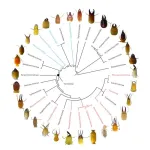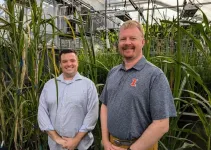(Press-News.org) New research has discovered a unique and promising avenue for diagnosing Alzheimer’s disease (AD) earlier – by analysing AD biomarkers in blood – so that the impacts of dementia can be reduced.
AD is the most common form of dementia, estimated to contribute to 60-70 per cent of cases, or more than 33 million cases worldwide, according to the World Health Organisation. Currently incurable, AD is usually diagnosed when a person is having significant difficulties with memory and thinking that impact their daily life.
University of Melbourne researcher Dr Brandon Mahan leads a group of analytical geochemists from the Faculty of Science who are collaborating with neuroscientists in the Faculty of Medicine, Dentistry and Health Sciences (based at The Florey) to develop a blood test for earlier diagnosis of AD, as described in a paper published in Metallomics.
In a world first, the researchers applied inorganic analytical geochemistry techniques, originally developed for cosmochemistry – for example, to study the formation and evolution of the Earth, the Moon, other planets and asteroid samples – and adapted these highly sensitive techniques to search for early biomarkers of AD in human blood serum.
They compared the levels of potassium isotopes in blood serum in 20 samples – 10 healthy and 10 AD patients from the Australian Imaging, Biomarker and Lifestyle study and biobank.
“Our minimally invasive test assesses the relative levels of potassium isotopes in human blood serum and shows potential to diagnose AD before cognitive decline or other disease symptoms become apparent, so action can be taken to reduce the impacts,” Dr Mahan said.
“Our test is scalable and – unlike protein-based diagnostics that can break down during storage – it avoids sample stability issues because it assesses an inorganic biomarker.”
Currently, clinical diagnosis of AD is based on medical history, neurological exams, cognitive, functional and behavioural assessments, brain imaging, and protein analysis of cerebrospinal fluid or blood samples.
“Earlier diagnosis would enable earlier lifestyle changes and medication that can help slow disease progression and would allow more time for affected families to take action to reduce the social, emotional and financial impacts of dementia,” Dr Mahan said. “It could also make patients eligible for a wider variety of clinical trials, which advance research and may provide further medical benefits.
“My research team – the Melbourne Analytical Geochemistry group – seeks partners and support to continue this important research and development.”
Co-author Professor Ashley Bush from The Florey sees promise in the results from the small pilot study.
“Our blood test successfully identified AD and shows diagnostic power that could rival leading blood tests currently used in clinical diagnosis,” Professor Bush said. “Significant further work is required to determine the ultimate utility of this promising technique.”
With the world’s population aging, incidence of AD is rising. The number of dementia sufferers is anticipated to double every 20 years and the global cost of dementia is forecast to rise to US$2.8 trillion by 2030. In 2024, more than 421,000 Australians live with dementia. It is the second leading cause of death in Australia and the leading cause for Australian women.
END
Novel biomarker could lead to early diagnosis of Alzheimer’s disease, pilot study suggests
2024-09-05
ELSE PRESS RELEASES FROM THIS DATE:
WEHI bioinformatician wins prestigious Eureka prize
2024-09-05
WEHI’s Bioinformatics division head, Professor Gordon Smyth, has won the 2024 Eureka Prize for Excellence in Research Software.
The award recognises Prof Smyth’s lead role in developing and designing the limma software package, which helps researchers detect changes in gene activity.
limma has helped researchers around the world detect changes in gene activity – a crucial element to finding new treatments for a range of diseases, like cancer – and has been used or cited in more than 70,000 published papers worldwide.
The Australian Museum Eureka Prizes are ...
The dictionary of termites has been rewritten
2024-09-05
Termites have a bad reputation. Most think of them as pests, a status that isn’t helped by their recent reclassification into the cockroach family.
But not only do the termites that cause serious problems for humans only make up 3.5% of all termite species, termites also serve as crucial ecosystem engineers, maintaining the infrastructure of various environments. Like earthworms, they circulate nutrients by decomposing plant materials, and they play the important role of bioturbators: much like plowing a field, termites aerate the soil, expose underground nutrients, and let water infiltrate deeper layers of soil – ...
CABBI team designs efficient bioenergy crops that need less water to grow
2024-09-05
Drought stress has long been a limiting factor for crop production around the world, a challenge exacerbated by climate change.
For more than a century, scientists have targeted a key plant trait known as water use efficiency (WUE) to help crops grow with less water and avoid suffering from drought stress. Greater WUE can help plants avoid drought stress — but for most crops it’s also associated with lower productivity when water is plentiful.
In a pair of new studies published in the Journal of Experimental Botany, ...
Texas A&M researchers discover that sustained neck exertions change the spine and muscles, causing pain
2024-09-05
Learning new languages, sending emails, attending a virtual class, or speaking to loved ones halfway around the world are just some of the tasks accomplished by touching a button on a smartphone. Unfortunately, the ease and convenience of modern devices have also come with a painful crick in the neck. The sedentary nature of work and prolonged use of hand-held devices and computers have contributed to a sharp increase in neck pain.
While fatigue in neck muscles has long been suspected of causing pain, the actual mechanical changes in the spine and muscles that precede weakness remain an outstanding question.
Now, using high-precision X-ray ...
Air pollution linked to higher risk of infertility in men
2024-09-05
Long term exposure to fine particulate matter (PM2.5) air pollution is linked to a higher risk of infertility in men, whereas road traffic noise is linked to a higher risk of infertility in women over 35, finds a Danish study published by The BMJ today.
If these findings are confirmed in future studies, they could help guide strategies to regulate noise and air pollution to protect the general population from these exposures, say the researchers.
Infertility is a major global health problem affecting one in seven couples trying to conceive.
Several ...
Prostate cancer rates across Europe since 1980 “indicative of overdiagnosis” say experts
2024-09-05
Rates of prostate cancer across Europe since 1980 are “indicative of overdiagnosis”, say researchers in a study published by The BMJ today.
Overdiagnosis refers to the detection of harmless cancers that are unlikely to cause symptoms or death during a patient’s lifetime, which can lead to unnecessary treatment, negative impacts on quality of life, and wasted healthcare resources.
The findings show rapid increases in the number of new cases (incidence) in parallel with uptake of so far predominantly opportunistic ...
Children switch to walking and cycling to school after introduction of London’s Ultra-Low Emission Zone
2024-09-05
Four in ten children in Central London who travelled to school by car switched to more active modes of transport, such as walking, cycling, or public transport, following the introduction of the Ultra-Low Emission Zone (ULEZ), according to new research. In the comparison area with no ULEZ, Luton, only two in ten children made this switch over the same period.
Car travel contributes to air pollution, a major cause of heart and lung diseases including asthma attacks. Beyond this, it limits children's opportunities for physical activity, hindering their development and mental health, and increasing their risk of obesity and chronic illnesses.
Despite ...
Three top ways to stop smoking
2024-09-05
A major new scientific review of evidence published in the journal Addiction has identified three top strategies for quitting smoking:
Varenicline -- a prescription drug sold under the brand names Chantix and Champix among others.
Cytisine -- a plant-based compound available under prescription in the United Kingdom, in Canada as an over-the-counter natural health product (Cravv®) and throughout central and eastern Europe.
Nicotine e-cigarettes.
These work best when combined with behavioural support, ...
Scientific review reveals top three effective ways to stop smoking
2024-09-05
A major new review of evidence by a team of scientists, including a University of Massachusetts Amherst public health researcher, has identified the three best strategies for quitting smoking:
Varenicline – a prescription drug sold under the brand names Chantix and Champix, among others.
Cytisine – a plant-based compound not widely available in the U.S. but sold as an over-the-counter natural health product (Cravv®) in Canada and throughout Central and Eastern Europe, and available under prescription in the United Kingdom.
Nicotine e-cigarettes.
The review, published ...
HudsonAlpha researchers awarded NIH grant to identify genetic contributors to rare diseases in children
2024-09-05
As genetic sequencing technology becomes more accessible and efficient, researchers have made significant strides in understanding the genetic underpinnings of various diseases. This knowledge has led to a surge in clinical applications of genetic testing, offering hope and improved outcomes for individuals affected by many genetic diseases and disorders. Despite these successes, scientists continue to try to improve genetic testing technologies, because many individuals with rare diseases remain undiagnosed even after current state-of-the-art genomic testing.
Scientists at the HudsonAlpha Institute for Biotechnology ...





